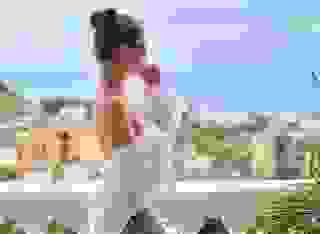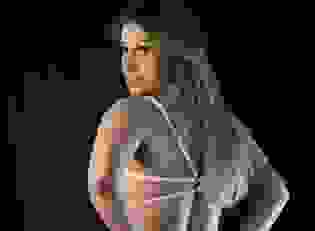Note: You can change font size, font face, and turn on dark mode by clicking the "A" icon tab in the Story Info Box.
You can temporarily switch back to a Classic Literotica® experience during our ongoing public Beta testing. Please consider leaving feedback on issues you experience or suggest improvements.
Click hereAbout that time I bid for and started flying from San Francisco to Tokyo; as a result I was away from home more than I ever had been before. When I was home Mary Ann was the same, yet different. She was all work, until she wasn't, then we would go out, go for drives on weekends or up to the city to bother my parents. We were everything but intimate, and suddenly I realized we were falling away from one another.
And then the thing I hated most about my father happened to me.
Here name was Patty. Patricia Brody, a wild-hearted, red-headed Bostonian who was, of course, a flight attendant. And she was, more often than not, on my Tokyo flight, and we were, more often than not, billeted in the same hotel. And one day it just happened. I'd known her a long time, had never thought of her as someone I'd like to spend that kind of time with, but it happened.
We went sight-seeing. We talked and laughed, I helped her pick out a baby Nikon and taught her the ins-and-outs of composing a photograph, to treat a camera with respect and to not waste time taking simple snapshots. Kind of ironic, don't you think?
We went to see The Empire Strikes Back and rolled in the aisles – laughing our asses off – as we watched Han and Luke screeching their lines – in Japanese. Of course we got around to talking about the sore subjects in our life, and for the first time ever I found Mary Ann at the top of that list.
So of course, before the night was over we had done the deed. We had cemented a new union, of sorts, yet another chapter of the Lonely Hearts Club was created – and we continued weekly our meetings for a while. I assumed Mary Ann never suspected a thing, and of course I never said a word about it. We had by that point abandoned the idea of having kids – and gravity took over. I doubted it would take long to come undone and spin apart.
Summer intervened before things got out of hand; gear and provisions were loaded on Sirius in one long weekend, and on a foggy Monday morning we motored through the Golden Gate towards the Farallon Islands, Dad at the chart table, Mom on the helm, Paul and Sara and their three kids – sitting on the deckhouse keeping a lookout for Great White Sharks – leaving Mary Ann to commune with Ben – and me, sitting by myself on the aft rail, looking back at our gurgling wake – watching that red bridge – and Patty – disappear in the mist.
We motored past the Farallons, keeping them to port, and by late morning the sun obliterated what fog remained and a breeze filled in. Sails went up, Dad and I shot noon sights and restarted our plot, turning to the next page in the logbook – that hadn't had a new entry in a very, very long time. The wind filled in, 20 knots solid off the starboard beam, and Sirius found her groove again, became the ocean greyhound we remembered from the summer of '65 – and we began cracking off real mileage that night.
With that much wind across the deck we kept the kids harnessed up and in the cockpit until they knew the routines better, and the old hands kept watch that first night out with everyone tucked away safely below.
I remember a full moon behind clouds racing south, big-fat clouds, white-rimmed and dark bellied – and waves that were soon in the ten foot range. Sirius flew off the wave-tops and plowed into the base of the next rolling mountain, sending walls of black water over everything topsides. I think the water temperature was 55F, the air temp around 45F, and we were soon cold, chilled to the bone.
Paul was with me then, in the cockpit, and we'd been alone together for a while when he leaned close.
"So, what's her name?"
"What? Who?"
"Sara thinks you're seeing someone. What's her name?" He was giving me that look, the 'don't bother lying to me – I know you too well' look.
"Patricia," I said.
"I'm not going to ask why. I guess it's none of my business, anyway, but you're married to one of the world's great women. I hope you haven't forgotten that."
"We're going through a rough patch," I said – as another mountain of ice water roared by.
He snorted. "Hell, what marriage doesn't?"
"What about you? Have you..."
He shook his head. "No. I mean, why bother? You're going to take your same way of dealing with the world into a new relationship, and odds are you're just going to create the same problems all over again. I think it's better to just deal with the problems you have, work them out, sort out what's most important and focus on that."
"That's worked out well for you?"
"Yup."
"Well, you've got kids to think of..."
"Is that what's bothering you? Kids?"
"It's become a dividing line, something we can't get around."
He nodded his head. "Sara thought so too."
"Well, she would. She's one of the world's great women, too."
"She has her moments. You still love Mary Ann?"
"Yup. More than you know."
"I doubt that. Still, she's not stupid, Spud. She deserves the truth, you both deserve time to work this out without some other woman breathing down your necks."
The cockpit was right over the aft cabin, the cabin where Mary Ann and I slept, and she was down there. There was a portlight in that cabin, a portlight that opened into the cockpit, and it was open. She was sitting in the dark, listening to every word we'd just said, then I heard that portlight shut, heard her dogging it down, then I heard her putting on her foul weather gear – and I saw her coming up the companionway steps a moment later. She stepped into the cockpit and came over to me, sat down beside me and kissed me, once, on the lips, then she looked at Paul.
"How does the helm feel?" she asked him.
"Lots of vibration still, and kind of heavy."
"Why don't you go below, get some tea and warm up."
He nodded his head and she slipped behind the wheel, steered over a looming wall of water and surfed down the backside. When Paul was below she spoke again – keeping her eyes on the way ahead. "How far has it gone?"
"I don't know."
"Too far?"
"Nothing's ever too far, Mary Ann. Not where you and I are concerned."
"I'm not going to ask why...I think I know, and I think I understand...but don't do anything drastic without talking to me first."
"Okay."
We sat in the dark watching marching waves under a kaleidoscope of moonlit spray, the way ahead shades of black and dark silver.
"Maybe you should just get it out of your system, you know?" she said a half hour later.
"Too confusing. I was never meant to love two women." I had been looking at her all this time, at her and the passing spray, dissolving diamonds falling from the sky. I studied her face, her face so familiar, so much a part of who I was now.
"Oh?" she said, looking at me for an instant.
"I think I was born to love you."
"I fell in love with you the first moment of our first year, before school even started."
"I don't remember that?" I said. "What happened?"
"I'd just arrived. A social worker put me on a bus in Baton Rouge. To Boston," she said, "then got on one of those Peter Pan buses to Springfield. Someone from school picked me up, and on the drive north we stopped at that little airport in Northampton. Your father and you were standing by an airplane, then I realized it was your airplane. I had no idea anyone could own something like that, and I'd never known anyone who could fly."
"I remember that now. The old Travel Air."
"You looked like a God to me, Spud. Standing there in the wind by that airplane. Now you put on that uniform and go fly those huge airplanes – like maybe just anyone in the world can do what you do – but they can't, Spud. To me, you'll always be that God, that wild, wind-blown God, and I'll never love anyone else. I can't, I couldn't. I worship you, I always have."
"But, why...?"
"Because I feel like I've let you down. It's me, Spud. My plumbing broke, and we won't have another child because of me."
"Why didn't you tell me?"
"Because I let you down. Maybe I thought you needed to find another woman, have kids, move on to to a new life. Because that would be better for you."
"It wouldn't last. I can't breathe when I'm away from you for too long."
She laughed. "You'd learn, Spud."
"Doubtful." I sighed, wondered if I should take the next step, then I went on, stepped into the darkness. "Do you remember Durong, Durong Thánh?"
"The pilot who..."
"Yup."
"Yes, of course."
Durong Thánh, Mig-21 pilot who shot my ass down. I was his fifth, so he made Ace on me. Durong, who, when he discovered my BN, Norm Puckett, had a dislocated shoulder and that I was bleeding to death, got to work with first aid kit in his teeth and kept me from bleeding out. He worked on me in the helicopter, he kept working on me all the way to the Connie's Sick Bay. Puckett told me the kid saved my life, and he was treated civilly until he was released after the war wound down, I think in no small measure because he had.
He called me the day he was released, asked if he could come meet me somewhere and talk.
For some reason the Navy cut him that much slack, and he came to San Francisco, visited me on Sirius. We talked about that night, about how it was nothing personal, just war. He'd been locked up for a couple of years, and he'd done nothing but think about that night. About how one minute he'd been trying to kill me, and the next trying to save my life. Nationalism fell away in those moments, all the patriotic fervor he'd grown up around simply vanished as he watched my blood billowing out into the godawful brown water.
The State Department let him stay aboard for a few days, and I assumed responsibility for him, promised that I'd get him to a charter flight to Hanoi a few days hence, and I did. We talked all the while, this kid about half my size and three years younger than I, and somewhere in there we slipped from the uncomfortable terrain of adversary into the uncharted water of a new friendship. When he left, before he walked out to the DC-8 taking him home, we hugged, and we promised to keep in touch.
And the funny thing about this is – we did. Regularly, as a matter a fact. And when I started flying into Tokyo we met up from time to time. He was a captain by then, for Vietnam Airlines, flying Boeing 707s from Hanoi to Tokyo and back. I'd just met his wife, before we left on the trip to Hawaii, and we'd discussed life back in America. Mary Ann and the baby situation came up and she looked at me, asked me a question I'd never expected.
"Do you want a baby?" she asked.
"I think I do. I think Mary Ann would too."
"It is not a problem, you know. We have hundreds of orphans in Hanoi alone. There are no homes for them, and it is not a problem to adopt."
"I didn't know you'd kept up with him," Mary Ann said, looking from the wave-tops to me and back. "How is he doing?"
"He's actually doing good. Real good." There are symmetries in life that haunt us, follow us unawares, and I mentioned this. "His wife is a doc, an obstetrician."
"Oh? That's kind of funny," she said.
"I met her a few weeks ago."
"Oh? Is she nice?"
"I talked about us. She mentioned that there are hundreds of kids in Hanoi alone, orphans. She said adoption is no problem."
And she looked at me, stopped looking at the waves and just looked at me. I jumped behind the wheel, took over as she slid away, made room for me.
"And what did you say?" she said after a long pause.
I shook my head. "Not much. I'm not sure how I feel about it – not yet, anyway. You?"
She sighed, shook the cold away. "I love the idea. It's the reality I'm not so sure about."
"Exactly."
"Do you think we could go over there, have a look around?"
"I think so. I'm not sure what restrictions are in place right now."
She slid close again, put her head on my shoulder. "This is kind of a crazy, mixed up world, isn't it?"
"Holy-mother-of-God!" I yelled – then – "Hang on!"
A huge wave – I'd guess now, looking back on the moment, perhaps the height of a two story building – came up out of nowhere and Sirius raced up the face, hesitated a moment, then fell off the backside – surfing down the wall at breakneck speed.
And there was an even bigger wave waiting in the night, just barely visible now – a huge, feral monster – rising up like a mountain range, suddenly looming overhead.
Mary Ann darted below, slammed the companionway hatch shut just as this next freight train slammed into the hull, and Sirius rolled drunkenly to her beam end – and as this second wave broke over us Sirius rolled further and further over – until her masts pointed to the seafloor, perhaps three miles below.
Rushing water filled the cockpit and I lost my grip on the wheel as we turned over – and the next thing I saw was Sirius, upside down, sails ripped from their tracks, lines coiled like snakes hovering everywhere in black shadows cast by the scudding moon, then bubbles everywhere. Then tons and tons of lead in her keel exerted force against the water and slowly Sirius began to right herself. It took what felt like hours, but in reality was probably less than half a minute – and when I came to the surface I saw that I was perhaps twenty yards away from my boat, my home, and that her sails were filling fast. I was swimming for my life as she began sailing away, and the last thing I saw was Mary Ann coming on deck, looking around for me – then screaming.
+++++
I think not even a month later we were in Hanoi, walking with Louise Thánh through the obstetrics hospital where she worked, and Mary Ann was, I could tell, aghast. To call conditions there primitive might have been going to far, but for someone working on the leading edge of a rapidly changing branch of medicine, what she saw during this slowly unfolding tour was just hardly bearable.
We came to a neonatal unit, what might have been a neonatal unit in the States in, say, the 1950s, and she looked at a row of blue-skinned babies dying and she turned away.
"What is wrong?" Louise asked.
Yet Mary Ann tried to keep to herself, tried to turn away. She knew the problem, knew the solution, yet the solution wasn't available in this country – yet. So she looked at those half dozen kids, who all would die within hours, and she was overcome with helplessness. Then anger. She went to one of the neonate nurses and asked for a chart – in French – then she read through the chart, slowly, carefully.
Then she turned to Louise.
"There is no treatment plan. Why?"
"These babies will die soon."
"Yes, I know that, but what are you going to do about it?"
"There is nothing we can do for these babies."
"You wanna bet?"
"What?"
"Find me an anesthesiologist. Quickly, if you can."
I looked at Mary Ann, knew that tone, and yet she'd promised me she wouldn't do this.
A harried looking doc came by, and for some reason the kid spoke decent English and Mary Ann drilled him on what she wanted to do.
"We have no surgeon here who can do that," the anesthesiologist said.
"I'm going to," my wife said.
"You are not on staff," Louise said. "You cannot do this."
"Why not? I can save this kid. It'll take me twenty minutes."
"You are not serious," the anesthesiologist said.
"If you've got a pediatric surgeon around, I can do it in even less time, and I can teach him the procedure."
Louise took off in one direction, the anesthesiologist in another. Fifteen minutes later she was scrubbed in, starting the procedure. It took her twenty five minutes, and the kid was pink and full of life the next morning.
We had come to look at potential kids to adopt, and all of a sudden Mary Ann had an epiphany. Over the next week, talking to Norman Shumway, her boss at Stanford, and members of the hospital's government ministry, she developed, on the spot, a teaching program she wanted to set up there. She would volunteer to teach one week a month, for a year, and nurses, techs, and Stanford anesthesiologists would come with her. There was equipment back in Palo Alto no longer in use that could imported, that could save lives, so much we can do...
And the ministers balked.
Mary Ann was in tears. "Why will you do nothing for these children? We'll bring a new level of medicine to your country...?"
"Perhaps," I said later, "because we brought a new level of devastation to their country. Perhaps because they don't like to be reminded that America once lorded over them. Perhaps because the resent the Great White Fathers once again sticking our noses into their business."
That evening another ministerial type came to our room, just after Durong and Louise arrived.
"Could you come with me, please?" the man asked. "All of you?"
We went.
For a ride in the country.
We came to a house. A nice house, clean and small, but not fancy.
We went inside, and found in an ancient man in bed, a nurse be his side. He was thin and pale, looked vaguely familiar, and he spoke perfect English after he'd looked over Mary Ann.
"You have kind eyes," he said, and there was an air about this old man I had a hard time pinning down – and suddenly I wished Sara was with us.
And without saying a word Mary Ann was at his side, feeling this pulse and that, looking over his chart, then she moved to his ankles and felt here and there. She took a nearby stethoscope and listened to his heart, then his lungs, had him lean forward and she listened again. When she was finished she stepped back and looked at the man, and waited.
"How long will I live?" he finally asked.
And Mary Ann shrugged. "A week, perhaps."
"And from what I've heard, you can repair this?"
"With the proper equipment on hand, the operation might take an hour."
"And I would live?"
She nodded her head.
"I see. And you do this for children?"
"That is my area of expertise, yes."
"I have been told about what you did. And what you want to do. Could you tell me why?"
"Because I hate suffering. When I see a problem I know I can fix, I want to do so."
"And you see a problem you can fix?"
"No, I see suffering I can alleviate."
The old man nodded his head. "I understand. I would like to know of another thing."
"Yes?"
"I have been reading of this trip you made, by sea, last year. And about the storm you endured. The news accounts were vague, so I wondered. You saw your husband in the sea, and you dove in after him. Why?"
"Because without him I would not want to go on living."
"It's as simple as that?"
"Yes."
"Yet your friends were able to turn the ship around and get to him, to you both, with little trouble. Why did you not wait?"
"Because I did not want him to be alone. I had no way to know we'd been picked up, and I did not want him to die alone."
He looked at her the longest time, his eyes measuring hers. "Your kindness is true, I think. In my next life, I would hope to meet you." He coughed, had trouble catching his breath, and Mary Ann went to him, held his wrist and felt his rhythms.
"I can have the equipment needed her within a day. I can have you walking within a week."
"I will consider this. In the meantime, I want you to move forward with your plans to teach. You will find no further obstacles along this path."
And as Mary Ann began crying the old man suddenly became grandfatherly. "Yes, I would pray that I meet you in our next life," he said gently. "Please, do not cry. I know these are tears of joy, but you have much to do now. Certainly there is no time to spend with tears?"
"Yes. You're correct."
"Will you do my operation?"
"I will assist. There is another man, much more experienced with your procedure than I, who I will ask to come."
"I would like you there."
"Then I will be."
"There are two people I would like you to meet now," he said, and a door opened. Two kids I thought might have been three or four years old came into the room, and they stood beside the old man's bed with their heads bowed. "These are my grandchildren. Their parents were killed several weeks ago, and I am concerned for their future. I understand you are looking to adopt children and I would like you to consider raising this remnant of my family."








